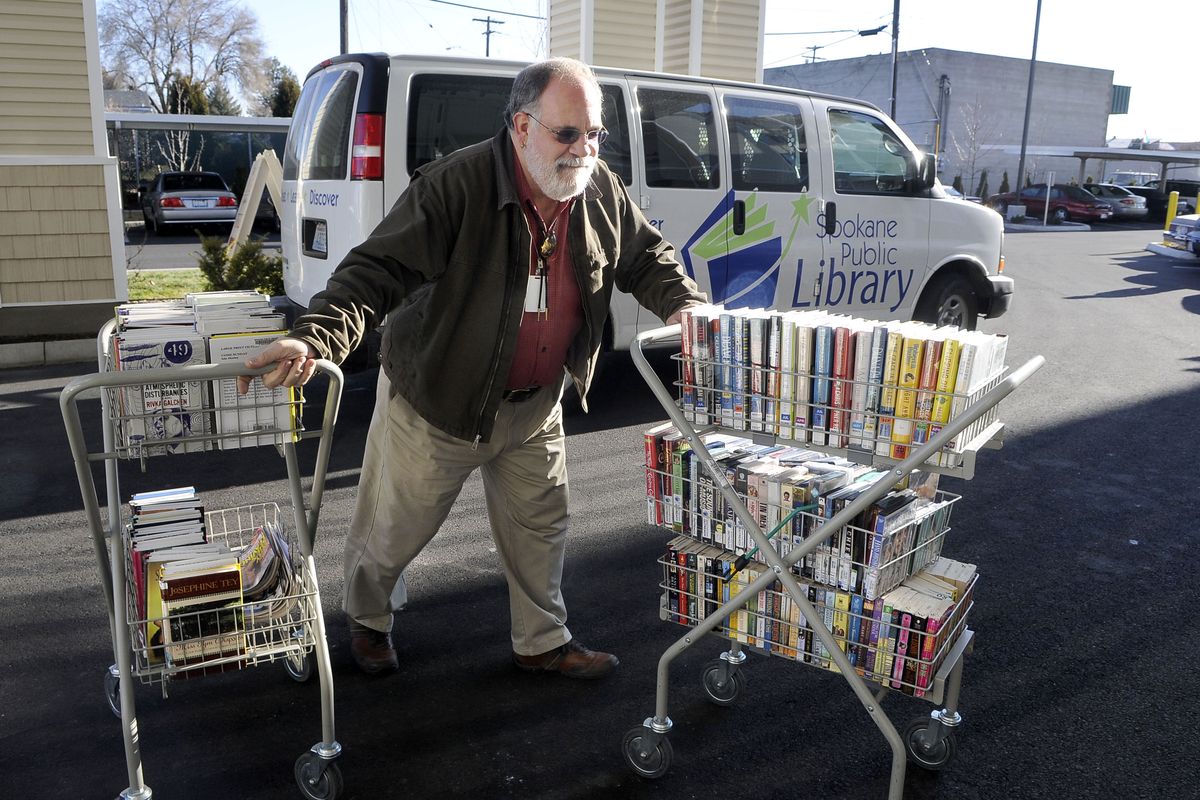Traveling librarians
When it comes to reading enjoyment, pair delivers

Each month the library comes to the Vintage. This retirement center in north Spokane is just one of 42 locations that Spokane Public Library outreach librarians Judy Killin and Al Kiefer visit every month.
“We’ve got our own little branch on wheels,” Killin said. “Little” is right. Eighteen years ago, Killin worked with a staff of 11, in their own location – they even had a Bookmobile. But budget cuts in the early ’90s reduced the staff to just Killin and Kiefer.
Yet this team of two continues to bring the joy of reading to hundreds of local residents. “I’ve got one of the best jobs in the world,” said Killin.
When she and Kiefer pulled up to the Vintage in the library van, residents hurried out to greet them. They helped the two librarians unload several carts filled with books, DVDs and books on CD, and set up the “library” in a room just off the lobby.
Jean Gilbert was one of the first in line. “I’m legally blind,” she explained. “I check out 20 to 30 CDs a month.” She pointed to Killin. “This lady has taken excellent care of me.”
Patrons like Gilbert inspire and motivate Killin, but when she began working for the program 30 years ago she found her job difficult. “It was pretty tough emotionally,” she said. “I’d get attached to the people I visited, and then I’d lose them.”
However, she said realizing her job enriched the lives of so many gave her a more balanced perspective. “So many can’t hear the TV or just don’t watch it,” she said. For them books are a source of entertainment and information, and the library’s monthly visit becomes a much-anticipated social event. “We’re truly like a building with big arms,” she said.
At the Vintage, Killin and Kiefer set up laptop computers and began to check out books as residents lined up with their arms full. Large-print books, magazines and books on CD are in high demand. Some residents brought wheeled carts or suitcases to transport their treasures.
Norma Smith said, “I can take the bus to the library, but I can only carry one or two books back home.” She paused to choose another novel from one of the carts. “This is the highlight of the month. We really look forward to it.”
Retirement facilities aren’t the only recipients of outreach services. Homebound patrons can have books mailed to their residences at no charge. In addition, the library offers a youth outreach program. Every month, Kirsti Nelson-Funston visits dozens of area day cares and preschools.
“The objective is to deliver story times and books to low-income areas in the city,” she said. “We’re serving people who may not be exposed to a lot of books.”
Nelson-Funston tries to augment the curriculum of the facilities she visits. For example, if a preschool is studying insects, she’ll bring books on the subject to the classrooms and read “buggy” books to the kids. “It’s fun to walk into a room full of children and hear, ‘The story lady’s here!’ ” she said.
And fun is also the way Kiefer describes his job and his co-worker. “It’s a joyful job,” he said. He and Killin share an abiding friendship, having worked together for more than 20 years.
As the pair assisted folks at the Vintage, it became obvious how well they know their patrons. They pulled novels by bestselling authors from several stacks set aside for frequent users. They know who wants more Dean Koontz, who enjoys Louis L’Amour and who is reading up on the Civil War.
Eva Silverstone, communications manager for Spokane Public Library, mourns the budget cuts that have affected the program. “It’s been whittled and whittled,” she said. “But it’s a really important service that we’re proud of.”
The Spokane County Library District has been more fortunate, said branch services manager Ellen Miller. “We haven’t had budget cutbacks,” she said. But three years ago, the county shifted their program to what Miller called a community-based outreach program.”
All county outreach services are provided by local branches to patrons in their geographic area. The changes have saved time and transportation costs.
Killin and Kiefer log a lot of miles in their library van, but both agree the service they provide is worth the work involved. “I had a patron tell me once, ‘This is as good as Christmas,’ ” Killin recalled. “But then she added, ‘No. It’s better than Christmas, because it comes every month.’ ”